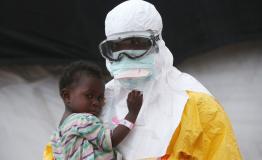

Liberia
It is estimated that 10 per cent of people in Liberia suffer from a mild to moderate mental health disorder, and 3 per cent suffer from a severe disorder. Epilepsy is also widespread, as past studies have shown a prevalence between 2.8 and 4.9 per cent. People with these conditions often lack access to treatment and face social stigma that can lead to exclusion from schools or jobs.
We support five health facilities in Montserrado County with diagnosis, treatment and essential medicines for people with mental health conditions and epilepsy. Our teams also supervise health workers in outpatient departments and make hospital referrals when necessary. In addition, we collaborate with psychosocial workers and volunteers to identify patients and work with families and communities to reduce social stigma.
In 2015, we opened MSF's Bardnesville Junction Hospital, providing paediatric care in the capital, Monrovia, during and after the Ebola epidemic. The hospital is now closing in several phases, which will be complete on 30 September, 2022. Moving forward, we are supporting Liberia's Ministry of Health in upgrading a nearby primary health care centre to provide in-patient paediatric care.
Our activities in Liberia in 2021
Data and information from the International Activity Report 2021.
365
365
€8.3 M
8.3M
1,990
1,99

IN 2021
In 2021, we continued to offer specialised paediatric care in Bardnesville Junction Hospital, which we opened in Monrovia during the Ebola epidemic six years earlier. Malnutrition, malaria and lower respiratory tract infections are some of the most common conditions among the children we treated. We resumed the hospital's paediatric surgery programme, which was disrupted in 2020 due to COVID-19, and carried out urological, reconstructive plastic and emergency surgery. We also resumed hands-on paediatric training programmes for Liberian health workers, such as nursing students, nurse anaesthetists and intern doctors.
Mental health and epilepsy
Medications for mental health and neurological disorders, such as epilepsy, are not widely available in Liberia. People with these conditions often face social stigma that can lead to exclusion from schools or jobs. In 2017, we started supporting health facilities in Montserrado county to diagnose and treat patients with mental health conditions or epilepsy, and supplying essential medicines.
In 2021, we continued to expand our cohort of patients through five health facilities. Our team supervised health workers treating patients on an outpatient basis and made hospital referrals when necessary. We also coordinated psychosocial workers and health volunteers to work with patients' families and communities, addressing social stigma.
Ebola preparedness
After Ebola reappeared in neighbouring Guinea in 2021, we sent a team to Nimba and Lofa counties to help health workers detect and prepare for potential cases of Ebola in Liberia's border areas.

5,070
5,07
20,300
20,3
